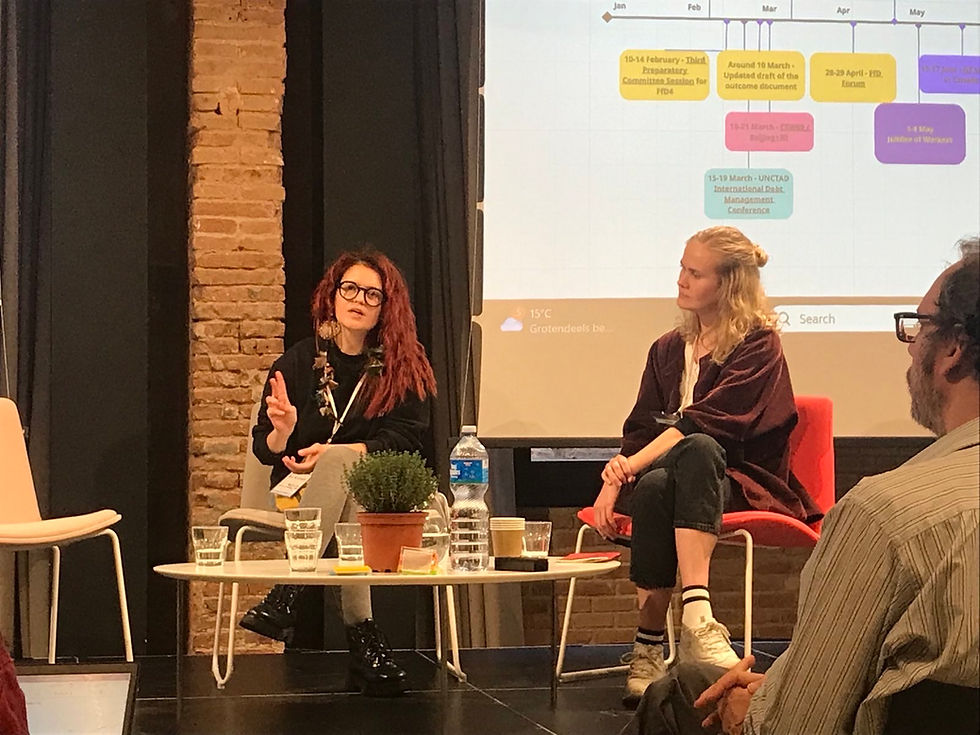Debt And Extractivism
- Scarlett

- Mar 25, 2025
- 4 min read
Updated: May 13, 2025

Intervention by Scarlett from Debt For Climate during Stop Pillage, the counter-summit on raw materials in March 2025 in Lausanne.
Debt for Climate is a global grassroots movement of movements, initiated by the Global South from an anti-colonial perspective. We are building power from the bottom up by uniting workers, Indigenous and local communities, feminists, and faith-based, environmental, social, and climate justice movements in both the Global North and South. Our goal is to cancel the illegitimate financial debt of the Global South to stop exploitation and extractivism, enabling self-determined, just transitions.
For us, debt is a relationship of power and profit, it is a blackmailing instrument, it is a continuation of formal colonialism, it is a trap, and finally, it is exploitation. In one of his studies (1), Jason Hickel (an economic anthropologist), provides some calculations . Between 1995 - 2015, Global North has taken from the Global South:
12 billion tonnes of raw materials
822 million hectares of land - for reference, that is almost the size of Russia
188 million person per year equivalents of labor
392 billion hours of work
22.8 trillion US dollars
Thomas Sankara, former president of Burkina Faso, pointed this out in his call for united debt cancellation shortly before his assassination in 1987. Global North drains from the South commodities worth $2.2 trillion per year, in Northern prices. For perspective, that amount of money would be enough to end extreme poverty, globally, 15 times over. As long as debt exists, exploitation, extractivism, and capitalism will not stop or fall. I will give you a few examples of instances in which creditors forced countries in the Global South to exploit their resources to pay their debts and their interests without going into too many details. All these examples are from a factsheet put together by Debt For Climate, you can read it here with the sources.
Senegal was pressured by the World Bank to open up for more oil and gas extraction by Australian, US, and British companies. The IMF is delighted by this fossil-fuelled growth.
Recent negotiations have given creditors the right to 30% of Suriname’s oil revenue until 2050.
Ecuador plans to double oil production by 2025 to help pay foreign debts.
The IMF pushed Argentina to allow European and US companies to frack in Vaca Muerta, despite fierce opposition from local and indigenous communities.
The IMF put forward coal and gas extraction as a solution to Mozambique’s debt crisis and climate disasters. It actively encourages the expansion of the fossil fuel industry in Mozambique by, for instance, creating new tax policies beneficial for coal and gas producers.
If a country tries to cancel fossil fuel projects, Investor State Dispute Settlements could cost it billions, pushing the country further into debt. Global South governments have already been forced to pay out $100 billion to corporations in the coal, oil, gas, electricity and mining industries in response to climate and/or environmental measures they have put in place.
Between 2015 (signing of the Paris Agreement) and 2021 alone the IMF endorsed or directly supported the expansion of fossil fuel infrastructure in 105 countries.
Canceling the debt of the Global South countries makes sense on different levels. We have trillions of dollars worth of resources, still in the ground in these countries, and trillions of dollars in debt owed by these countries to the International Monetary Fund, World Bank, BlackRock, and other private investors.
On behalf of that debt, these countries, through what they call debt trap diplomacy (the correct term is blackmailing if you ask me) are forced to accept more extractivist projects that benefit the already insanely rich companies and people. And this is not only about the Global South. The same people, concentrated powers and institutions are exploiting the workers and people here in the North. These are the corporations that are making record profits, the financial colonialist system that is making people poor, and the richest 1%, that are responsible for twice as many emissions as 50% of the poorest people in the world.
So what can we do? We have to mobilize. We have to make a common front here, in the Global North, to support the united front that’s gaining momentum in the Global South. As Debt for Climate, we make a call for global mobilizations around two events this year. One of those events is the International Conference on Financing for Development, which will take place in Seville from June 30 to July 4. Why is it important to mobilize against this conference? Through a process under the UN umbrella they are planning on restructuring the financial architecture, and one of the main topics on the political agenda is debt swaps, which I hope everyone agrees is a false greenwashing solution. And Switzerland plays a big role in this. Swiss banks have been deeply involved in the debt swaps that happened in recent years, but there’s little information that can be found publicly.
Our second Global mobilization is around COP30, which will be held in Belem (Brazil), from November 10 to November 21. In Abya Yala we are organizing Caravana Mesoamericana that will bring movements and collectives to Belem. A similar caravan will leave New York and from Europe, a group will travel by boat. We are in conversation to organize an AntiCOP here in Europe as well. It’s important to support our comrades from the Global South in their fight against this financial system. So let’s unite to cancel the illegitimate debts!
(1) Imperialist appropriation in the world economy: Drain from the global South through unequal exchange, 1990–2015. Jason Hickel, Christian Dorninger, Hanspeter Wieland, Intan Suwandi. Global Environmental Change Volume 73, March 2022.




Comments